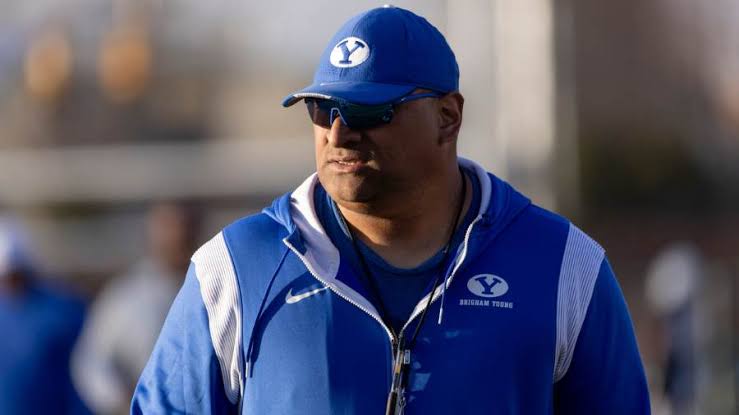

The BYU–Utah rivalry isn’t your average Saturday clash—it’s a generational standoff. This is war disguised as football, a red vs. blue divide where families split down the dinner table and friendships hit pause for 60 minutes. So, when a former Ute defects to Provo? That’s not just a transfer—it’s a full-blown betrayal in the eyes of the north.
Watch What’s Trending Now!
Keanu Tanuvasa knew exactly what he was signing up for. The moment he peeled off that Utah red and slipped into BYU’s royal blue, the backlash wasn’t just loud—it was personal. This wasn’t a quiet move in the portal. This was a headliner in the Holy War saga. After three hard-hitting seasons on the Utes’ defensive line, Tanuvasa didn’t just flip jerseys—he lit a fuse in the middle of one of college football’s most passionate feuds. He crossed over into enemy territory, with half the state calling him a traitor and the other half embracing him as a brother.
ADVERTISEMENT
View this post on Instagram
But what really stirred the hornet’s nest were his words. At Big 12 Media Days, Keanu opened up about the emotional toll of leaving Utah, saying he “broke down consistently” for two weeks after entering the portal. “I felt like I had given [my all] to the University of Utah, everything that I wanted to give it,” he told ESPN700. “I don’t know if there was a player that was more bought into that program than I was…I sacrificed, and I don’t want to sound prideful, but really a lot more than some guys were willing to.”
ADVERTISEMENT
The quote blew up—faster than a snap-count blitz—and backlash hit hard. Misquoted posts on X made it sound like he was throwing his former teammates under the bus. Utah fans swarmed. Many felt betrayed. Keanu later clarified that he “misspoke” and wasn’t comparing himself to anyone else. But the damage was already done. You don’t walk through the flames of the Holy War without a few scars.
Now, why did Keanu really leave? That’s where things get layered—and a bit soul-searching. In a separate sit-down with ‘Locked on Utes,’ he broke it down with gut-level honesty. “First and foremost was my faith in God,” he said. “I believe that God had led me to a promised land in my own mind that was necessary.” He also cited the need to build his brand and protect his body, especially coming off an MCL tear that derailed his 2024 season.
ADVERTISEMENT
Keanu’s journey at Utah wasn’t a wash—far from it. Keanu played in 7 games, started six, and racked up 17 total tackles, 4.5 for loss, and a sack. He was impactful in rivalry games—four tackles each against Arizona and BYU. He earned All-Big 12 Honorable Mention, proving he was more than just rotational depth. But after missing time due to injuries and feeling stagnant, the NFL Draft didn’t seem like the next step. A fresh start did.
“I just remember thinking, ‘Maybe there’s another home for me,’” Keanu told ESPN700. “I felt like I was becoming too content with who I had fought to become at the University of Utah.” His move didn’t come without collateral damage. Keanu admitted some of his Utah relationships went cold. “I will still love them, even though there’s a lot of emotional feelings. xMany of them are still bitter. I just went to one of the boy’s weddings, and it was a tough experience.” It took months for some of those friendships to thaw, but he’s started rebuilding bridges. Slowly.
ADVERTISEMENT
And despite what people assumed, NIL wasn’t the golden carrot. “I recognized that money comes and goes,” he said. “If I’m gonna have an NFL career, then the money I make in college matters, but it’s not life-changing. What I needed to take into consideration was a lot more things of my spiritual life and who I wanted to become.”
Enter Kalani Sitake.
ADVERTISEMENT
The BYU head coach knows this firestorm better than most. He once coached at Utah before taking over the Cougars. So when Tanuvasa arrived in Provo, Sitake didn’t just see a transfer—he saw a young man standing at a crossroads. “Sometimes people take things out of context,” Sitake said. “But if you know his heart, you know where he’s at. We’ve just got to ease up a little bit and try to put yourself in his position.”
ADVERTISEMENT
Keanu Tanuvasa on his future and the BYU-Utah rivalry
Keanu isn’t running from the rivalry—he’s charging straight into it. The Holy War isn’t just a game on his calendar anymore. It’s personal. And it’s political. And it’s deeply spiritual. “I understood transferring from a rival to another rival is going to be extremely difficult,” he said. “People are right in the way that they feel.”
This rivalry—62 wins for Utah, 36 for BYU, and four ties—isn’t just the backyard brawl it used to be. With both teams now in the Big 12, there’s more than just pride on the line. Playoff implications, conference titles, and a real national spotlight now hang in the balance. And Keanu? He’s walking into the lion’s den on both sides.
In the early 2010s, Utah dominated the matchup, nine straight wins through 2021. BYU’s 2021 win finally snapped the streak, giving Cougar fans a long-awaited breath of air. But after a brief hiatus, the rivalry roared back in 2024, and it’s only heating up heading into 2025. Both programs are eyeing a run at the Big 12 title. Keanu’s presence only makes the stakes that much higher.
ADVERTISEMENT
His defensive prowess gives BYU a major boost up front. A healthy Tanuvasa could be a disruptive anchor in the trenches, especially with a chip the size of Salt Lake City on his shoulder. But what’s more intriguing is what this move says about player agency, mental health, and spiritual identity in college football today.
ADVERTISEMENT
ADVERTISEMENT
ADVERTISEMENT
.png)
.png)
.png)



